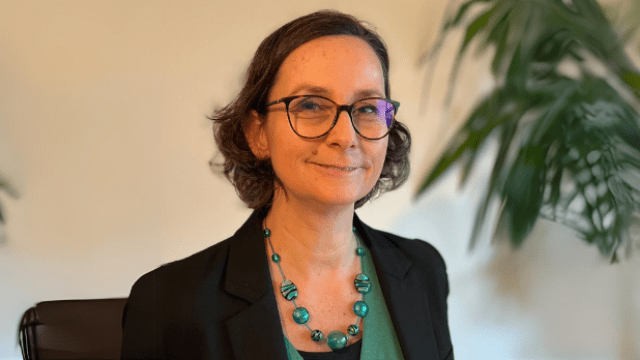Florence Niedergang (promotion 1990 - biologie-biochimie) is a research director at CNRS. This internationally recognized immunologist has been leading the Cochin Institute for two years, one of the most important centers for fundamental and biomedical research in France and Europe, comprising 600 collaborators spread across five scientific axes and ten technological platforms.
Accepted at ENS Paris-Saclay in 1990, Florence passed the biochemistry aggregation exam three years later. "Research intrigued me, but coming from a family with no connection to this environment, I had no idea about the steps to take," she recalls. During her Master's internship at the Pasteur Institute, she decided to pursue a Ph.D., securing a teaching assistant contract at the University Paris-Diderot. "I found myself facing students who were a year younger than me, a real challenge!" she remembers. Despite the stress, she found teaching exhilarating. "Students chose my immunology lab work because I found it easier to explain complicated concepts I had recently encountered." For her, research and teaching complement each other. "I could just as easily have pursued a career teaching in vocational education, I think I would have enjoyed that too!" she remarks with humor.
After defending her thesis in 1997, she spent two years as a postdoctoral fellow at the University of Lausanne, funded by ARC and the European Molecular Biology Organization (EMBO). Upon returning to France, Florence was recruited by CNRS and worked for four years at the Curie Institute. Shortly after joining the Cochin Institute in 2005, she established her team, "Phagocyte Biology, Infection, and Immunity." She studies the very fundamental, even biophysical aspects of phagocytic cells, "those that capture bacteria and eliminate them by communicating with other cells of the immune system or aspects related to certain pathologies following viral infections," adds the researcher. The team consists of about a dozen people, no more, no less, "to maintain a certain coherence across all our topics."
ENS Paris-Saclay: A Leading Research School
Not a day goes by without Florence Niedergang drawing on her training as a "normalienne." "Researchers juggle daily, not only with the different levels of analysis, from the organism to the molecular level, but also with all areas of biology, not to mention chemistry or biophysics. All of this was cultivated at ENS Paris-Saclay," she asserts. The training, especially during the preparation for the aggregation exam, allowed us to cover all fields of biology." She also remembers the (filmed) practice sessions for public speaking, delivering structured, reasoned, and concise presentations. "I use it every day to adapt each of my presentations to different audiences."
In 2022, the researcher succeeded Axel Kahn and Pierre-Oliver Couraud as the director of the Cochin Institute, after having successively served as a team leader, co-director, and department head. She hesitated for a long time. "I aspired to continue conducting quality research in parallel. Because, as it stands, researchers are still judged on their ability to publish articles, raise funds, and recruit good students." Once assured, she took the time to share her vision for the Institute's development with all the collaborators. "Even though I am constantly juggling between directing the Institute and managing my lab, I am very happy now because it was the right time to move the Institute forward," she confides. In particular, she is involving the Institute in scientific outreach activities for various audiences. "We don't talk enough about the scientific process," she laments. Today, around a hundred collaborators mobilize each year for the Science Festival, and the Institute has partnered with several associations that work with young people in schools in Paris and the suburbs.
"If someone had told me 30 years ago that I would be directing a research institute, I would have said: never in a million years!" exclaims Florence Niedergang. "You have to follow your instincts and be opportunistic in the best sense of the word, not hesitate to try what suits you at each stage of your career," she advises future "normaliens." "Research is a competitive field but it is extraordinary. So, don't hesitate to persevere; and if you are a woman, especially, do not hold back!"
[1] researchers, clinicians, teacher-researchers, engineering technicians and administrators, as well as young scientists, postdoctoral fellows, doctoral students, and students at various levels up to the master's level

Comments0
Please log in to see or add a comment
Suggested Articles


